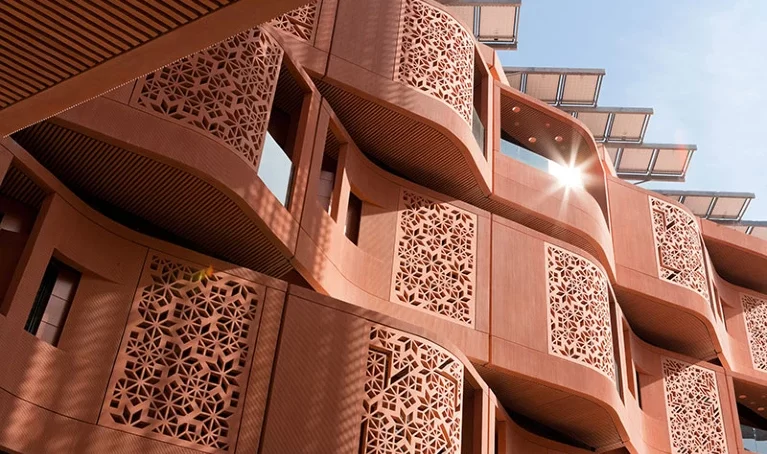
The world’s green spotlight is tilting towards the Middle East as Egypt and the United Arab Emirates (UAE) prepare to host the next two major world summits on climate change.
Egypt’s Sharm El-Sheikh resort will be the site of the next United Nations Climate Change Conference of the Parties (COP27), which begins on 6 November, and the UAE’s oil giant Abu Dhabi will host COP28 in 2023.
According to a report published by UN Climate Change this week, Egypt and the UAE are among 26 countries that have updated their climate targets in line with promises made last year at COP26 in Glasgow, UK.
Egypt is promising to further cut greenhouse-gas emissions from electricity, transport and the oil and gas sectors, although this is only compared to previously forecast levels – and the commitment is contingent on receiving international financial support.
The UAE is pledging to cut greenhouse-gas emissions by 31 per cent by 2030, compared to business-as-usual level, which is beyond its previous promised cut of 23.5 per cent.
The UN report says commitments made by countries in the past year will reduce projected emissions rises to 10.6 per cent above 2010 levels by 2030, compared to the 13.7 per cent forecast in a similar analysis last year. But they remain well short of what the world needs to limit warming to 1.5 °C by the end of the century.
Sameh Shoukry, Egypt’s minister of foreign affairs and the COP27 president, called the findings alarming and said they merit “a transformative response at COP27”.
The next two COP summits will mark an “important moment” for the Middle East, says Carlos Duarte, a marine ecologist at the King Abdullah University of Science and Technology, near Jeddah, Saudi Arabia. It’s a significant change from the past. In the 1990s, Saudi Arabia consistently blocked action on climate change, while other oil-rich nations, including the United States, tried to stall it, says Michael Oppenheimer, a geoscientist and climate-policy researcher at Princeton University, New Jersey.
Saudi Arabia’s representatives on the Intergovernmental Panel on Climate Change (IPCC) doubted the scientific consensus on global warming, says Ben Santer, an atmospheric scientist at the Lawrence Livermore National Laboratory in Livermore, California and one of the lead authors of the second IPCC assessment report in 1995, which confirmed that human activities were warming the planet.
By contrast, the past decade has seen the region embrace renewable technologies and focus on the environment. Today, Saudi Arabia and other major oil-producing countries are “not fighting the reality of the science”, Oppenheimer says.
For states that rely on oil revenues, this move is about trying to diversify their economies in the face of a future fall in demand, as well as using renewables to provide for growing domestic populations while saving fossil fuels for export, says Mia Moisio, a researcher in climate policy at the New Climate Institute think tank in Berlin. Vulnerability to climate change is another driver, she adds. “The region is seeing these extreme heatwaves. That has probably also been a bit of a wake-up call.”
The UAE’s environmental credentials include being home to the International Renewable Energy Agency (IRENA), which was inaugurated in 2015 in Masdar, Abu Dhabi’s flagship effort to create a sustainable city. Last September, Razan Al Mubarak, managing director of Abu Dhabi’s environmental regulator, was elected president of the high-profile International Union for Conservation of Nature, which is based in Gland, Switzerland.
In October, the UAE became the first Arab nation to pledge to reach net-zero domestic emissions by 2050. Efforts are also picking up in other Middle Eastern nations. Saudi Arabia – the world’s largest oil exporter – and its neighbour Bahrain have set net-zero targets for 2060.
Gas-rich Qatar, meanwhile, has announced plans to cut its emissions by 25 per cent by 2030 and has created its first climate-change ministry. Israel and Turkey have both announced goals to reach net zero by the mid-2050s.
More widely, the Middle East Green Initiative, spearheaded by Saudi Arabia last year, has announced a goal to reduce carbon emissions from the region’s oil and gas industry by 60 per cent, although no deadline has been given. This industry is one of the world’s largest sources of methane.
“For the first time, we’re seeing a lot of countries that used to be, or are still, heavily dependent on their hydrocarbon sector, come out with these net-zero pledges,” says Moisio, who also works on the Climate Action Tracker, which rates countries according to their climate pledges and actions.
So far, few details are available on how the countries will achieve these climate goals. However, both the UAE and Saudi Arabia are backing their targets with sizeable investments, including building or expanding carbon-neutral cities.
The UAE government says it will invest 600 billion dirhams (around $163 billion) in clean and renewable energies by 2050. The Saudi government estimates that investment across its Saudi Green Initiative will amount to 700 billion Saudi Arabian riyal ($186 billion).
According to Bloomberg New Energy Finance, an energy consulting company headquartered in New York City, overall investment in renewables in the Middle East has risen sevenfold in a decade, from $960 million in 2011 to $6.9 billion in 2021.
Saudi Arabia invested around $1.5 billion in solar energy alone last year, and the UAE has put almost $9 billion into the technology since 2017. “There is quite profound change we’re seeing in the region in terms of investment,” says Mercedes Maroto-Valer, a chemical engineer and researcher in energy systems at Heriot-Watt University, which is based in Edinburgh and also has a campus in Dubai.
- A Nature report











